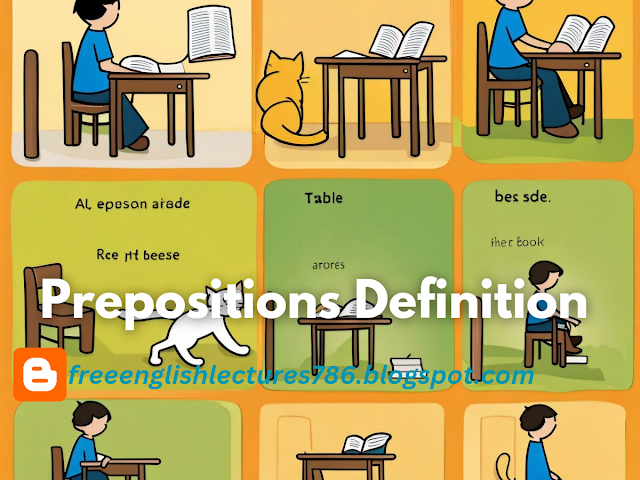Prepositions Definition
 |
| Prepositions Definition |
Prepositions are an essential part of the English language that helps establish relationships between words, phrases, and clauses. They provide crucial context and convey the spatial, temporal, or logical relationship between different elements within a sentence. In this article, we will explore the definition of prepositions, their functions, and examples to enhance your understanding. So, let's dive in and unravel the world of prepositions!
Table of Contents
1. Introduction: What are Prepositions?
2. Prepositions and Their Functions
1. Spatial Relationships
2. Temporal Relationships
3. Logical Relationships
3. Commonly Used Prepositions
1. Prepositions of Place
2. Prepositions of Time
3. Prepositions of Direction
4. Proper Usage of Prepositions
5. Mistakes to Avoid with Prepositions
6. Exercises to Practice Prepositions
7. Conclusion
8. FAQs
1. Introduction: What are Prepositions?
In grammar, a preposition is a word or group of words that establish a relationship between a noun or pronoun and another phrase in a sentence. These relationships can indicate direction, location, time, manner, or other logical connections. Prepositions are often short words such as "in," "on," "at," "by," "with," and "from."
2. Prepositions and Their Functions
2.1 Spatial Relationships
Prepositions play a vital role in expressing spatial relationships. They help describe where something is located or the position of objects about each other. For example:
• The book is on the table.
• She walked through the park.
• The cat is hiding under the bed.
2.2 Temporal Relationships
Prepositions also help us convey temporal relationships, indicating when something occurs. They allow us to express specific time frames, durations, or points in time. Consider the following examples:
• We will have a meeting at 3 p.m.
• I always exercise before breakfast.
• She has been studying since morning.
2.3 Logical Relationships
In addition to spatial and temporal relationships, prepositions establish logical connections between different elements in a sentence. They help express reasons, causes, manners, or conditions. Here are a few examples:
• She sings like an angel.
3. Commonly Used Prepositions
Let's explore some commonly used prepositions and their respective categories.
3.1 Prepositions of Place
• In The cat is in the box.
• On The book is on the shelf.
3.2 Prepositions of Time
• After They went to the movies after dinner.
3.3 Prepositions of Direction
• From He received a gift from his friend.
3.4 Prepositions of Agent or Instrument
• By The painting was created by a famous artist.
• With She wrote a letter with a pen.
• Through We solved the problem through teamwork.
4. Proper Usage of Prepositions
To use prepositions accurately, it's essential to consider the context and meaning you want to convey. Pay attention to the relationship between the words and ensure the preposition fits appropriately. Here are a few tips to remember:
• Choose the right preposition based on the specific context.
• Be mindful of idiomatic expressions that use specific prepositions.
5. Mistakes to Avoid with Prepositions
While using prepositions, it's common to make certain mistakes. Here are a few errors to watch out for:
• Confusing similar prepositions (e.g., "in" and "on," "at," and "to").
• Using prepositions where they are not needed.
• Neglecting to use prepositions when required.
6. Exercises to Practice Prepositions
To improve your understanding and usage of prepositions, it's helpful to practice with exercises. Here are a few activities you can try:
1. Fill in the blanks with the appropriate prepositions.
2. Rewrite sentences using different prepositions to change the meaning.
3. Create sentences that demonstrate specific spatial or temporal relationships.
7. Conclusion
Prepositions are indispensable linguistic tools that allow us to express relationships between words, phrases, and clauses. You can enhance your English language skills by understanding their functions and mastering their usage. So, embrace the power of prepositions, and let your communication soar!
FAQs
Q1: What is the role of prepositions in a sentence?
A1: Prepositions establish relationships between words, phrases, and clauses, providing essential context and conveying spatial, temporal, or logical connections.
Q2: Can prepositions have multiple meanings?
A2: Yes, some prepositions have various meanings depending on the context. For example, "over" can indicate physical position or convey the idea of superiority.
Q3: Are there any prepositions that are always followed by specific words?
A3: Certain prepositions are commonly used with particular words or phrases. For instance, "in" is often followed by a month, and "on" is used with specific days.
Q4: How can I improve my preposition usage?
A4: Practice is key to improving your preposition usage. Engage in exercises, read extensively, and consult reliable grammar resources to enhance your understanding.
Q5: Are there any preposition exceptions I should be aware of?
https://kissoffering.com/t455t9hy?key=7c2940eab416a7a487d3afb6cd03db9f
A5: Some verbs and adjectives require specific prepositions, which may deviate from conventional usage. Pay attention to these exceptions to ensure accuracy.





0 Comments